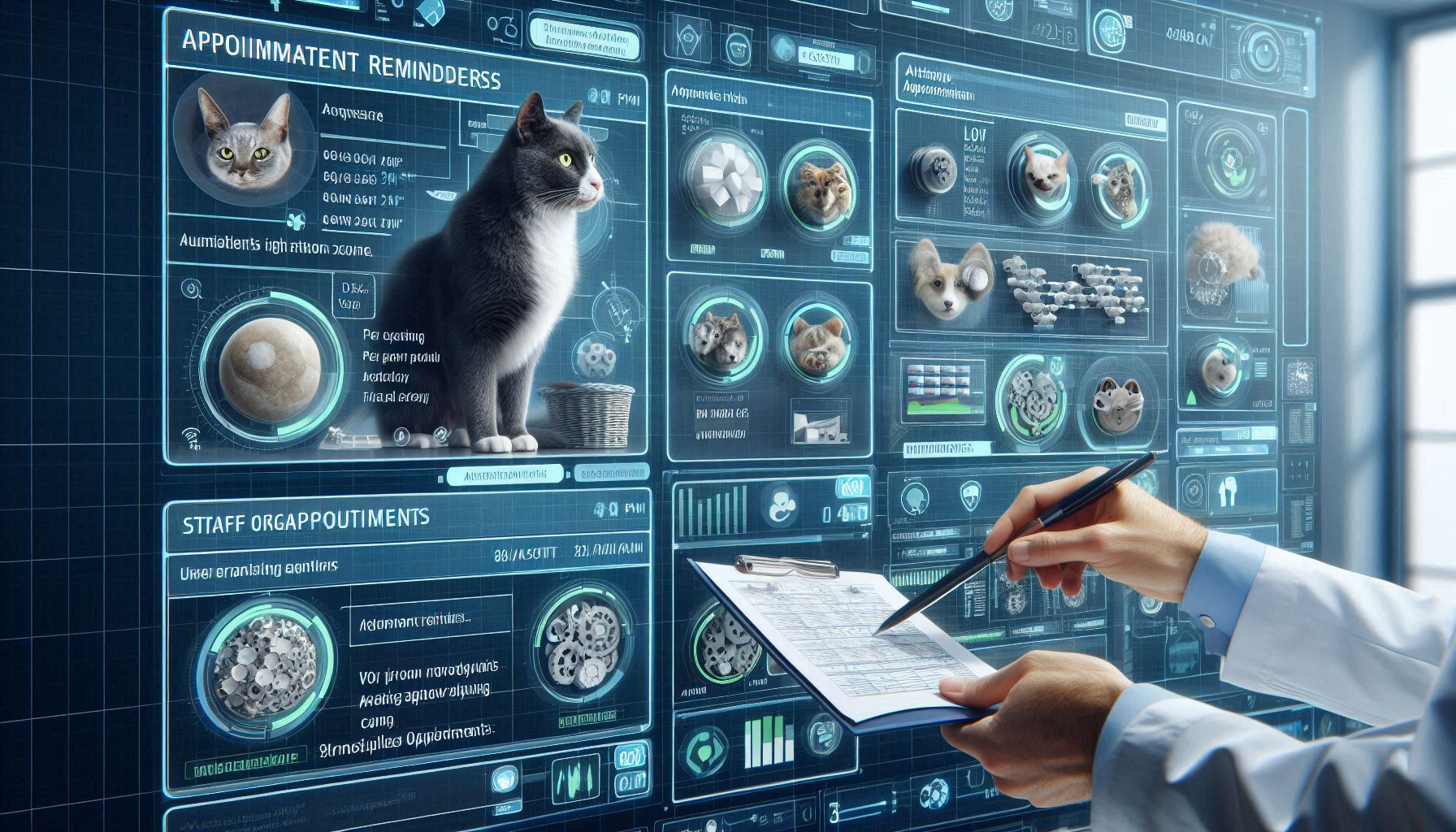Introduction: The Role of CRM in Veterinary Clinics
In today's competitive veterinary landscape, effective client relationship management is no longer optional—it's essential. Customer Relationship Management (CRM) tools have emerged as game-changers for veterinary practices, offering a comprehensive solution to streamline communications, personalise services, and ultimately strengthen the bond between clinics and pet owners.
By implementing a robust CRM system, veterinary clinics can deliver a higher level of care, respond to client needs faster, and create lasting connections that go beyond traditional veterinary services.

1. Why CRM is Essential for Veterinary Clinics
A CRM system provides a centralised platform for managing client data, tracking interactions, and automating routine tasks, allowing veterinary clinics to operate more efficiently. By helping clinics stay organised and client-focused, CRM tools ensure that each pet and their owner receive personalised and timely attention.
Benefits of CRM for Veterinary Clinics:
- Enhanced Client Communication: CRM allows clinics to streamline communication, keeping clients informed about their pet’s care through appointment reminders, follow-up messages, and educational content.
- Increased Client Retention: Regular, personalised communication fosters loyalty and keeps pet owners returning to your clinic for ongoing care.
- Improved Operational Efficiency: By automating tasks like appointment scheduling and reminders, CRM systems free up clinic staff to focus on direct client and patient care.
- Data-Driven Insights: CRM systems offer valuable insights into client preferences, visit history, and pet health trends, allowing clinics to make data-informed decisions.
Real-World Impact: Imagine a CRM that automatically tracks a pet's annual wellness exam schedule and sends timely reminders, reducing missed appointments and ensuring consistent preventive care.
2. Key Features of a Veterinary CRM System
A veterinary CRM system offers specific features that address the unique needs of veterinary practices. By utilising these features, clinics can enhance the client experience and streamline their daily operations.
Essential CRM Features for Veterinary Clinics:
- Client and Patient Profiles: Store detailed information on each pet and owner, including pet medical history, vaccine schedules, and owner preferences.
- Appointment Management: Schedule, track, and send reminders for upcoming appointments, reducing no-shows and helping clients stay on top of their pet’s health needs.
- Automated Reminders: Send automatic email, SMS, or in-app reminders for appointments, wellness checks, vaccinations, and follow-up visits.
- Health Record Tracking: Keep a comprehensive digital record of each pet’s health history, making it easy to review previous treatments and follow care plans.
- Communication Tracking: Maintain a log of all interactions, from appointment bookings to follow-up emails, allowing staff to provide personalised service.
Example Feature: Automated vaccine reminders can notify pet owners when their pet’s vaccinations are due, ensuring timely care and reducing the risk of preventable diseases.
3. Choosing the Right CRM System for Your Veterinary Clinic
Selecting the right CRM system for your clinic depends on your practice’s specific needs, size, and budget. Look for CRM systems that integrate seamlessly with other software your clinic uses, such as billing and inventory management systems.
Considerations for Choosing a CRM:
- Scalability: Select a system that can grow alongside your practice's expansion.
- User-Friendly Interface: Prioritise intuitive designs that staff can quickly master.
- Customisation Options: Look for systems offering flexible features adaptable to your specific operational requirements.
- Integration with Other Software: Ensure compatibility with existing billing, inventory, and marketing tools.
- Mobile Accessibility: Choose solutions offering robust mobile access for on-the-go practice management.
Example CRM: A veterinary-specific CRM like ezyVet or Hippo Manager may provide tailored features like patient record-keeping, appointment tracking, and health reminders, which address the specific needs of veterinary clinics.
4. Enhancing Client Communication with CRM Tools
One of the primary benefits of a CRM is its ability to streamline client communication. By using CRM tools, clinics can automate important messages, keep pet owners informed, and maintain consistent engagement.
Ways CRM Improves Client Communication:
- Automated Reminders: Send timely reminders for upcoming appointments, vaccine schedules, and preventive treatments, keeping clients engaged and informed.
- Follow-Up Messages: After each appointment, send personalised follow-up emails to thank clients and provide any necessary aftercare instructions or product recommendations.
- Seasonal Health Tips: Use the CRM to send seasonal pet health tips, such as reminders about flea and tick prevention in spring or holiday safety tips in winter.
- Birthday and Anniversary Messages: Acknowledge pet birthdays or anniversaries with the clinic, offering a special discount or small gift as a token of appreciation.
Example Communication: After a dental cleaning, automatically send a follow-up email with post-treatment care guidance and links to recommended dental care products.
5. Using CRM Data for Personalised Client Experiences
CRM systems provide access to detailed client and pet data, allowing clinics to tailor services and communications based on specific needs. By analysing client data, clinics can improve service delivery and create meaningful interactions with pet owners.
Personalisation Strategies with CRM:
- Personalisation Strategies with CRM:Customised Health Plans: Use data on pet age, breed, and health history to recommend tailored wellness plans, preventive care, and age-appropriate treatments.
- Pet-Specific Recommendations: Suggest relevant products or services based on pet history. For instance, recommend joint supplements for older dogs or grooming services for long-haired breeds.
- Targeted Outreach: Segment your client base based on factors like pet species, age, or health conditions. Send targeted messages to each group, such as senior pet care tips or exercise advice for younger pets.
- Loyalty Programs: Track and reward client loyalty with exclusive offers, discounts on repeat services, or early access to special promotions.
Example: If a client’s pet has a history of allergies, the CRM can help send reminders about hypoallergenic products and special discounts on related treatments, creating a personalised experience.
6. Streamlining Daily Operations with CRM Automation
A CRM system automates many administrative tasks, allowing clinic staff to focus on patient care and improving the client experience. Automation also minimises errors and ensures consistency across all client communications and processes.

Automation for Veterinary Clinics:
- Automated Appointment Reminders: Set up reminders via SMS or email, reducing no-shows and helping clients stay on top of their pet’s care.
- Recurring Appointments: Schedule recurring visits, such as monthly grooming or wellness exams, to keep pets on a consistent care schedule.
- Invoice and Billing Management: Automate billing and invoicing to streamline payments, helping clients easily keep up with bills and improving cash flow.
- Inventory Alerts: Track inventory levels for essential supplies, setting alerts when stock runs low to avoid shortages and ensure treatments are always available.
Example Automation: Set up automated appointment reminders to send a 24-hour reminder before every scheduled appointment, improving attendance and reducing missed visits.
7. Analysing CRM Data to Drive Clinic Growth
A CRM system provides valuable data insights that allow veterinary clinics to understand trends, assess client satisfaction, and identify growth opportunities. By leveraging CRM analytics, clinics can make informed decisions about marketing strategies and service offerings.
Key CRM Metrics for Veterinary Clinics:
- Client Retention Rate: Track the percentage of clients returning for multiple visits, indicating overall satisfaction and loyalty.
- Appointment Frequency: Measure how often clients bring their pets in for appointments, identifying opportunities to encourage regular visits.
- Service Utilisation: Analyse which services are most popular, helping you understand client preferences and optimise your offerings.
- Campaign Performance: If using email or SMS marketing through your CRM, track open rates, click-through rates, and conversion rates to refine your outreach.
Example of Data Use: If you notice a high demand for preventive dental care services, you might consider promoting these services more heavily or offering related products, like dental chews, in the clinic.
8. Ensuring Data Security and Compliance with CRM Systems
Veterinary clinics handle sensitive client and pet information, so data security is essential. A reliable CRM system will offer security features that protect client data and comply with data privacy regulations.
CRM Security Features to Look For:
- Data Encryption: Ensure the CRM system encrypts data to protect against unauthorised access and potential data breaches.
- Access Controls: Use access controls to restrict sensitive data access to authorised staff only, maintaining client confidentiality.
- Secure Backups: Look for CRM systems with automatic, secure data backups to prevent data loss in case of technical issues.
- Compliance with Regulations: Verify that your CRM system complies with relevant data protection laws, such as GDPR or HIPAA, depending on your region’s requirements.
Pro Tip: Train staff on best practices for data security, ensuring everyone understands the importance of safeguarding client information.
Conclusion: Enhancing Veterinary Client Relationships with CRM
CRM systems are invaluable tools for veterinary clinics, allowing them to streamline operations, personalise client experiences, and foster long-term loyalty. By using CRM technology, veterinary clinics can improve client communication, provide exceptional care, and make data-informed decisions that drive growth. Whether managing appointments, tracking client preferences, or automating reminders, a well-chosen CRM system helps veterinary clinics stay organised and client-focused. Implement CRM practices in your clinic today to build stronger relationships and support pets and their owners more effectively.
Transform Your Veterinary Practice with Powerful CRM Strategies
Unlock the Secrets to Veterinary Practice Success: Dive into the "Veterinary Lead Generation Blueprint"—Your Comprehensive Guide to:
- Mastering Client Relationship Management
- Boosting Client Retention
- Automating Practice Operations
- Personalising Pet Care Experiences
Don't let administrative challenges hold your veterinary practice back. Discover proven strategies that will revolutionise how you manage client relationships and grow your business.
Get Your Copy Now and Take Your Veterinary Practice to the Next Level!
About the Author
Shawn Smith
Digital Marketing Strategist & Veterinary Practice Growth Expert
With extensive experience in digital marketing and a passion for veterinary practice success, Shawn Smith has crafted the ultimate blueprint for transforming your clinic's client management approach.
Let’s connect! Feel free to reach out to me at
✉️ shawn.smith@devonshireagency.com
Adapted from "Veterinary Lead Generation Blueprint: Proven Strategies to Attract High-Quality Clients."